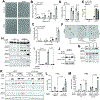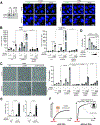Stress granules are shock absorbers that prevent excessive innate immune responses to dsRNA
- PMID: 37028415
- PMCID: PMC10170497
- DOI: 10.1016/j.molcel.2023.03.010
Stress granules are shock absorbers that prevent excessive innate immune responses to dsRNA
Abstract
Proper defense against microbial infection depends on the controlled activation of the immune system. This is particularly important for the RIG-I-like receptors (RLRs), which recognize viral dsRNA and initiate antiviral innate immune responses with the potential of triggering systemic inflammation and immunopathology. Here, we show that stress granules (SGs), molecular condensates that form in response to various stresses including viral dsRNA, play key roles in the controlled activation of RLR signaling. Without the SG nucleators G3BP1/2 and UBAP2L, dsRNA triggers excessive inflammation and immune-mediated apoptosis. In addition to exogenous dsRNA, host-derived dsRNA generated in response to ADAR1 deficiency is also controlled by SG biology. Intriguingly, SGs can function beyond immune control by suppressing viral replication independently of the RLR pathway. These observations thus highlight the multi-functional nature of SGs as cellular "shock absorbers" that converge on protecting cell homeostasis by dampening both toxic immune response and viral replication.
Keywords: ADAR1; RIG-I-like receptor; antiviral signaling; dsRNA; immune-mediated apoptosis; immunopathology; innate immunity; integrated stress response; molecular condensate; stress granule.
Copyright © 2023 The Authors. Published by Elsevier Inc. All rights reserved.
Conflict of interest statement
Declaration of interests B.t. is a cofounder of Archean Biologics. S.H. is a consultant for Odyssey therapeutics and CJ Cheil Jedang.
Figures







References
Publication types
MeSH terms
Substances
Grants and funding
LinkOut - more resources
Full Text Sources
Miscellaneous

